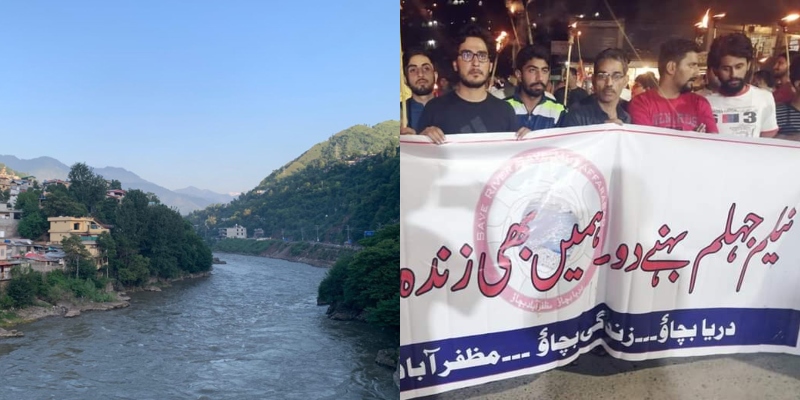- Web
- Today
Kohala hydropower project threatens extended drought, environmental crisis
-

- Web Desk
- Sep 10, 2024

By Faiza Gillani
MUZAFFARABAD: Forty-four-year-old Raja Farrukh Mumtaz, a political and social leader, fears that the completion of a proposed hydroelectric project will deplete natural water resources in his area, raise local temperatures, and reduce rainfall.
Raja Mumtaz hails from the Khawra region of Azad Jammu and Kashmir (AJK), located along the Jhelum River near Kohala, where a hydroelectric power project is being jointly undertaken by Pakistan and China.
He highlights that the AJK Environment Protection Agency (EPA) has already warned that the region’s natural water resources have been alarmingly reduced by the Neelum-Jhelum Hydropower Project.
Locals say that instead of ensuring compliance with the conditions set by the EPA for the Neelum-Jhelum Hydropower Project, the government of Pakistan is now pushing for the construction of the Kohala Hydropower Project, which threatens to further deplete local water resources.
Local residents said that the diversion of the Jhelum River for the Neelum-Jhelum Hydropower Project has already raised local temperatures by three to four degrees Celsius and posed serious risks to the region’s water resources.
Commenting on the situation, Raja Mumtaz stated, “If hydropower projects are necessary to address electricity shortages, they should be built on flowing rivers without altering their courses and disrupting the natural ecosystem.”

Kohala is situated about 40 kilometers south of Muzaffarabad. The foundation stone for the Kohala Hydropower Project was laid in 2011, but a tripartite agreement for its construction was finalised on June 26, 2020.
This agreement includes the construction of a 52-meter-high dam to generate 1,124 megawatts of electricity, with an estimated cost of $2.4 billion, a significant portion of which is being funded by China.
Also read: Probe reveals design flaws in Neelum-Jhelum Hydropower Project
The Kohala Hydropower Project will be jointly developed by the China Three Gorges Corporation and Pakistan’s Water and Power Development Authority (WAPDA) as a key component of the China-Pakistan Economic Corridor (CPEC).
Local Leaders Fear Project’s Impact on Environment and Community
Raja Amjad, a lawyer based in Muzaffarabad and an active leader of the “Darya Bachao Movement”, strongly opposes the diversion of the Jhelum River for the Kohala Hydropower Project, stating that it is unacceptable to the local population.
He explained, “Not only human life but local wildlife, aquatic life, and the entire ecosystem depend on the river. Diverting its course will disrupt this entire ecological and human system.”

Raja Amjad also holds the Environmental Protection Agency responsible for the potential environmental harm, arguing that the agency lacks the expertise to properly assess the social and environmental impacts of such hydropower projects.
According to him, “The institution is run by government officials who are incapable of analysing the consequences of these projects.”
He further highlights that the Azad Jammu and Kashmir (AJK) High Court, on November 15, 2019, ordered the extension of the EPA’s conditional NOC (no-objection certificate) for the Kohala Hydropower Project by four months.
The court had also directed the government of Pakistan and WAPDA to reach an agreement within a year to implement the conditions under which the NOC was issued. However, none of these conditions have been fulfilled.
The court had also mandated an environmental impact assessment (EIA) of the project by an internationally renowned expert, but, according to Raja Amjad, “This assessment has yet to be carried out.”
Like Raja Farrukh Mumtaz, Raja Amjad believes that the construction of the Kohala Hydropower Project will raise local temperatures by four to five degrees Celsius, which is a serious concern. “Even if the stipulated conditions for the project are met, its environmental impact cannot be effectively controlled,” he adds.
On October 9, 2018, the prime minister of Pakistan formed the commission chaired by Federal Secretary Shumail Ahmed Khawaja, consisting of members the AJK prime minister, the WAPDA chairman, and the additional secretary for development (ACSD).
The commission’s mandate was to review the issues arising from the Neelum-Jhelum Hydropower Project and report its findings to the prime minister of Pakistan. The commission submitted its report, prepared by Federal Secretary Shumail Ahmed Khawaja, on April 1, 2019.
The “Shumail Commission” report validated these concerns, stating that diverting the Jhelum River for the Kohala Hydropower Project could extend the region’s dry season by up to 100 days, negatively affecting the monsoon rains. It further warned that these changes would lead to a severe environmental and water crisis for communities around the project, including Muzaffarabad.
Zaid Amin Kashif, a prominent political and social leader in Kashmir and former head of the Prime Minister’s Inspection and Implementation Commission, criticised the Pakistan government and WAPDA, accusing them of adopting anti-people and anti-environmental policies since 2008.
He said that the construction of the Kohala Hydropower Project is part of this ongoing policy, which will result in “nothing but the displacement of local people.”
Faisal Jameel Kashmiri, a prominent leader of the “Darya Bachao Tehreek” (Save the River Movement), active in Muzaffarabad since 2015, expressed concerns over the Kohala project. According to him, the local population has staged multiple protests, but the government of Pakistan has largely ignored their grievances.
The “Darya Bachao Tehreek” aims to raise awareness about the disruption of natural river flows and the environmental and social consequences of large-scale hydropower projects in AJK.
When asked about the potential concerns arising from the project, AJK Prime Minister Anwarul Haq stated that his government could not yet comment on the matter, as work on the project had not started.




